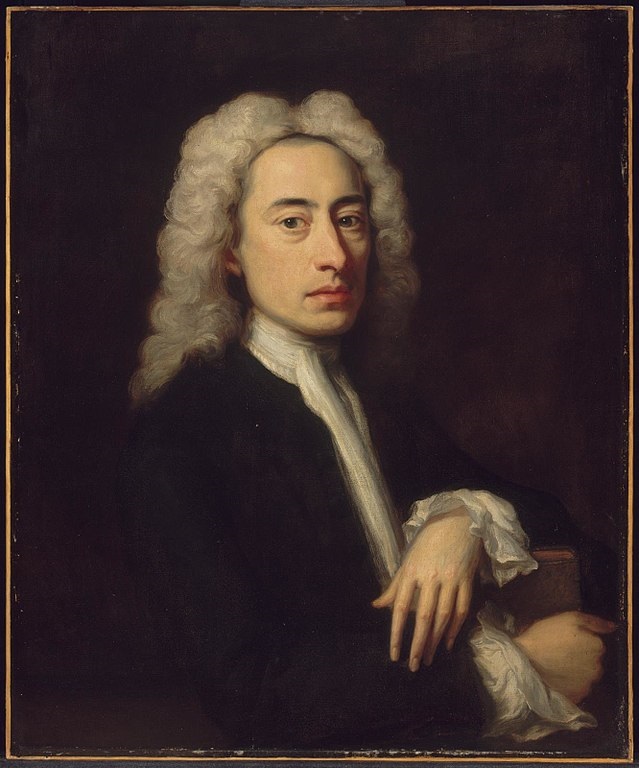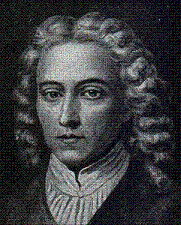| 1688, 21st May |
Birth
|
Born in London, Pope was the son of a linen merchant.
|
|
| 1688–1744 |
Catholicism
|
Pope was brought up as a Catholic at the time of the Test Acts introduced to promote and support the Church of England. The Test Acts also deprived Catholics of their rights to education, voting and holding public office.
More background on the Test Acts
|
|
| 1698 |
Education
|
Pope was initially educated at home, being taught to read by his aunt and only belatedly attending Twyford School in 1698. However, the young Pope was an avid reader of classical literature, particularly works by Horace, Juvenal, Homer and Virgil, as well as the writings of William Shakespeare and Geoffrey Chaucer and major figures of the Enlightenment such as John Dryden. In addition, Pope studied a number of languages, both classical and living.
|
|
| 1700 |
Childhood illnesses
|
As a boy, Pope suffered a number of serious illnesses, including a form of spinal tuberculosis called Pott’s disease when he was 12 years old. The illness ensured his growth would be stunted. As a result, Pope was only 4’6” in height and also developed a number of recurring ailments including difficulty in breathing.
|
|
| 1709 |
Publication and criticism
|
His first published work was ‘Pastorals’ which was included in part six of Jacob Tonson’s Poetical Miscellanies. The work was well received and brought Pope to the attention of the literary world, including members of John Dryden’s coterie such as Restoration dramatists William Congreve and William Wycherley. Pope also befriended the Blount sisters, one of whom, Martha, was the closest he had to a romantic companion throughout his life.
|
|
| 1711 |
Publication and stylistic development
|
Pope published ‘An Essay On Criticism’, a mildly satirical poem in heroic couplets on the subject of whether poets should abide by the rules of classical literature or write in a more personal, naturalistic way. In his lifetime, Pope was to be recognised as the prime exponent of the heroic couplet in iambic pentameter. His was a distinctively epigrammatic style characterised by great skill in employing allusions to the literature of the past.
|
|
| 1711 |
Fellowship with other writers
|
Pope formed the Scriblerus Club with John Gay, Jonathan Swift, Thomas Parnell and John Arbuthnot. These were writers with an allegiance to the Tory Party, and the purpose of the club was to produce poetry written under the guise of one Martinus Scriblerus which satirised social mores and intellectual behaviour that the writers considered ignorant.
An informative SlideShare on the subject of the Scriblerus Club
|
|
| 1712 (rev. 1714) |
The publication of ‘The Rape Of The Lock’
|
Arguably Pope’s most famous poem, ‘The Rape of the Lock’, is a mock-epic that satirises the exaggerated mannerisms, lavish consumption and sense of self-importance of members of high society. The poem describes the fury of ‘Belinda’ (a persona said to represent Lady Arabella Fermor) after Lord Petre cut off a lock of her hair against her wishes. The poem’s use of ironic overstatement draws a mocking parallel between the trivial dispute that is its subject and the great battles of the original classical epics.
|
|
| 1715–1720 |
Translation work
|
Pope translated the volumes of Homer’s Iliad from Ancient Greek into English. One volume per year was produced and made available to the public by subscription over six years.
|
|
| 1719 |
Success and financial independence
|
| 1723–1725 |
Transcriptions
|
Pope was commissioned by publisher Jacob Tonson to write The Works of Shakespeare in six volumes.
|
|
| 1726 |
Controversy
|
Pope took certain liberties with Shakespeare’s original texts, adding greater metrical regularity and rewriting certain lines as well as editing out approximately 1,560 lines of Shakespeare's material, citing his own personal taste as the justification for so doing. In 1726, lawyer and poet Lewis Theobald attacked Pope in a pamphlet entitled ‘Shakespeare Restored’, which indicated textual errors and revisions on Pope’s part.
|
|
| 1725–1726 |
Translation work
|
Pope translated (with William Broome and Elijah Fenton) Homer’s Odyssey from Ancient Greek into English. The translation was in five volumes.
|
|
| 1728–1743 |
The publication of ‘The Dunciad’
|
Initially published anonymously, ‘The Dunciad’ was published in three books in 1728. The second version and the ‘Dunciad Variorum’ appeared in 1729. The revised three-book version and an additional fourth book were published as ‘The Dunciad in Four Books’ in 1743.
|
|
| 1728–1743 |
Controversy
|
In ‘The Dunciad’ and its revised versions, Pope attacked certain ‘dunces’ such as lawyer and poet Lewis Theobald (who had criticised his work on Shakespeare) and the Poet Laureate, Colley Cibber. Pope was subsequently attacked by allies of his targets as well as the targets themselves, and this had a negative effect on his reputation. In addition, as an assault on the financial liberation brought about by the Whig government of Robert Walpole, the poem brought Pope (as it did Jonathan Swift for Gulliver’s Travels) powerful political enemies. One result of this was the false claim by Pope’s enemies that he was attacking the Duke of Chandos and his estate, Cannons, for wasteful extravagance in his poem of 1731, ‘Epistle to Burlington’. Although untrue, this caused Pope’s reputation added damage.
For added background on Pope’s disputes, and specifically the long-running one with Colly Cibber see: Charles D Peavy, ‘Pope, Cibber, and the Crown of Dulness’, The South Central Bulletin, 26:4 [Johns Hopkins University Press, South Central Modern Language Association], 1966, pp. 17–27
|
|
| 1732–1734 |
Philosophical beliefs
|
‘An Essay on Man’ is a philosophical poem which elucidated Pope's view of the universe as a perfect divine construct, the apparent flaws in which were the consequence of human limitations in understanding its ordered structure. Humans, for Pope, occupied the middle ground between angels and animals, and human happiness depended upon an acceptance of this fact. It was a human duty to rely on hope and develop faith in God’s plan for human beings. Such beliefs were relatively conventional and in line with much prior Western philosophy from classical times onward.
|
|
| 1733–1738 |
The Augustan style of imitation
|
Pope’s ‘Imitations of Horace’ were an example of the Augustan trend to imitate a classical poet, adding references relevant to a contemporary readership. The imitations were in both Latin and English, on pages facing one another, but the English displayed the flourishes and wit now familiar from Pope’s writing. Horace provided Pope with a model to launch a satirical attack on the reign of George II, points of contention being corruption in Walpole’s Whig government and the perceived lack of artistic appreciation at George’s royal court.
|
|
| 1744, 30th May |
Died
|
Pope was buried in Twickenham, in the nave of the Church of St Mary the Virgin.
|
|
| 1953–1967 |
Literary recognition
|
A definitive Twickenham edition of Pope's poems was published in 10 volumes.
|
|
| 1711–2021 |
Critical reception
In his lifetime, from the publication of ‘An Essay on Criticism’ in 1711 onward, Pope became the first English poet to be celebrated at the same time in France and Italy and other parts of Europe. His poems were translated in his lifetime into both living and ancient languages.
While feted in his lifetime, after Pope’s death the Augustan style of literature, defined most often by irony and imitation, fell out of favour. The Romantic poets of the early nineteenth century, for example, thought Pope’s work a triumph of technique over passion, although Lord Byron claimed him as an influence. This general ambivalence towards Pope’s work was largely due to the fact that he had exhausted the potential of the heroic couplet, leaving little scope for its use by the poets that followed him; consequently, it was used sparingly by the great poets that followed. In the twentieth century, Pope’s skills as an observer of the mores of his time were more highly valued as they gave readers valuable insight into early to mid eighteenth-century England.
|
|
| 2021 |
Legacy
Between 1716 and 1719, Pope lived in his parents' house in Chiswick, which is now a public house, the Mawson Arms. Pope is commemorated with a blue plaque outside.
In em> The Oxford Dictionary of Quotations, Pope is the third most quoted poet after Shakespeare and Tennyson.
Pope's Grotto Preservation Trust has restored the grotto at his Twickenham villa and this will be periodically open to the public from 2023.
|
|



